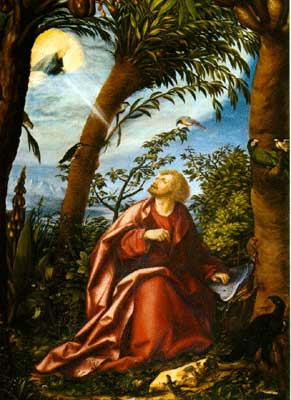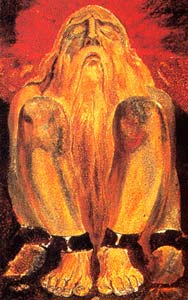 नोसिस और नोस्तिसिस्म
नोसिस और नोस्तिसिस्म  Gnosis: The Saving Knowledge
Gnosis: The Saving Knowledge
Gnosis: The Saving Knowledge |

|

|
| इस के लेख़क हैं Serge Hutin | |

The Greek word gnosis means “knowledge”. However, the Gnostic literature does not refer to any knowledge. Gnosis is an outstanding knowledge. Only a few can attain this knowledge; maybe one out of one thousand, or two out of ten thousand. Simon Magus begins his great “Revelation” (Apophasis) in the following way: "This is what is expressed in the Revelation of the Voice and the Name, which come from the Thought and from the Great Infinite Power; for that reason, it will be sealed, hidden and preserved at the dwelling where the root of the Whole has its foundations. Gnosis, possession of the Initiates, opposes the vulgar pistis (belief) of the faithful. Gnosis is not just a “knowledge”, but a secret and mysterious revelation. The Gnostic sects claim to possess books of an exogenous origin, that is to say, of an origin that is exterior and superior to the world in which we live. Such books are attributed to prestigious individuals, true celestial envoys. For instance, we quote a paragraph from the Sacred Book of the Great invisible Spirit, one of the works used by the Sethians: "This is the book written by the great Seth (one of the sons of Adam). He placed the book on high mountains, to a height that the sun never rises and never will be able to rise. Since the days of the prophets, the apostles and the preachers, not even (its) name was in their hearts. Nobody heard about it. This book was written by the great Seth when he was one hundred thirty years old; he placed it on a mountain called Charax, so that it were found in the last times, and in the last instants". All Gnostic-Christians claim to have inherited (through a mysterious way) the secret teachings given by Jesus to his disciples: Basilides, for example, claimed to have received from the apostle Mathias the esoteric doctrines revealed by the Saviour to this apostle. The Gnostic groups spread many apocryphal Gospels: such as the Gospel of the Egyptians, the Gospel of Mary, the Apocryphal of John (in Greek language, the literal translation of "apocryphal" is "secret book"), etc. Therefore, Gnosis implies the transmission of secret teachings, the transmission of “mysteries” that are reserved to a small number of “Initiates”, to the “generation of an unshakable faith”. What is the difference between Gnosis and other theosophical or occult doctrines? “The term Gnosis or Gnosticism is applied to any doctrine or religious attitude that is based in the theory or in the experience of attaining the salvation by means of the knowledge”. Gnosis always implies an individual need of salvation, of liberation: “ ... Gnosis -writes Mr. Puech- is an inner experience that is destined to become an inamisible (unlosable) state (from the Latin: inamissibilis, that means that cannot be lost)”. This inner state brings enlightenment (which is regeneration and deification), and man/woman recovers his/her truth, and remembers and acquires again conscience of himself, that is to say, man knows his true nature and origin; through this experience, man knows himself in God, man knows God, and man sees himself as emanated from God and apart from the world. Thus man acquires the possession of his “I” and his true condition; man acquires the explanation of his fate and the certainty of his salvation for all of the eternity. Theodotus, disciple of Valentinus, says that possessing gnosis is to know “what we were and what we are; where we were and where we have been cast out; where we are going to, and from where we will receive redemption; what is birth and what is resurrection”. Gnosis is the answer to the subjective anguish of the individual who is concerned about the great metaphysical enigmas. The Pistis Sophia (“Faith and Wisdom”), the most famous Gnostic work that is written in Coptic language, comprises a long enumeration of the knowledge acquired by the chosen souls: The reason why light and darkness were created, the chaos, the treasures of light, the impious ones and the righteous ones, the emanations of light, the sin, the baptism, the anger, the blasphemy, the injury, the adultery, the purity, the arrogance, the laugh, the slander, the obedience and humility, the wealth, the slavery; the reason why the reptiles exist, the wild beasts, the cattle, the precious stones, gold, silver, the plants, the waters, the Occident and the Orient, the stars, etc. So, Gnosis allows man to understand the meaning of everything since Gnosis reveals the origin and destiny of man. Such a “knowledge”, such an “enlightenment”, turns man into a prestigious being: 
The human being is a divine living creature that cannot be compared to the rest of the terrestrial living creatures, but to the creatures that inhabit up there, in the sky, which are called gods. Or better to say (if we dare to say the whole truth), the man who is really a man is above all those gods, or at least there is a complete equality of power between them. In fact, none of the celestial gods will cross the border of heaven and will descend on the Earth; but the human being rises up to the sky, measures it, and knows it from one extreme to the other; man grasps everything else with accuracy and supreme wonder, and he can be in the heaven without leaving the Earth: to such an extent his power is. You know the famous passage of St. Paul, which is often invoked by the Christian esotericism: I know a man in Christ, fourteen years ago (whether in the body, I don’t know, or whether out of the body, I don’t know; God knows), such a one caught up into the third heaven. I know such a man and how he was caught up into Paradise, and heard unspeakable words, which it is not lawful for a man to utter. Thanks to the enlightenment granted to him, the Gnostic uses his anguish in order to attain the definitive knowledge. Simon says (commenting a versicle of the Exodus): In fact, the water that we find after crossing the Red Sea is bitter, because this water is the way that leads to the knowledge of life, a way that goes through difficulties and bitterness. However, Moses, that is to say, the Word, transforms this bitter water into sweet water. Gnosis -also symbolized by an enlightening and generating fire- awakens the soul of the chosen one from the deep “sleep” in which the soul had sunk: this is the reason of the spiritual training methods intended for generating special states of consciousness and supra-consciousness. However, when one has attained Gnosis, it constitutes a total and immediate knowledge that the individual possesses entirely; it is the “knowledge per se”, absolute, that comprises the Human Being, the Cosmos and the Divinity. It is only through this knowledge that the individual can be saved -and in no way by means of his faith or his works-: regardless of the features of Gnosticism as a religious philosophy, Gnosis is defined by this general position, and also by the existential attitude that gives birth to it; Gnosis manifests its true originality in its condition of living experience. 
Paradoxically, in some Gnostic-Christians there is a desire to know the origin of evil: one version of Sophia's myth states that the error of this “wisdom” was the desire to contemplate the unfathomable Divinity; another mythical-metaphysical entity, Horos, “the Limit” will give Sophia the consciousness of the limits of its nature. Basilides announces the advent of the “great ignorance” that will take possession of all the existing beings, which will no longer yearn for knowing that which is beyond: “All the beings that stay in their right place are immortal”. However, such an attitude is completely exceptional in Gnosticism. The Gnostic saves himself by means of knowledge; however, from what must he be saved? This question demands to study the attitude of the Gnostic with respect to his body, to the visible world and to the sensitive existence in general. Complete article available in spanish  |
| The Gnostics > |
|---|
| कला |
| दर्शनशास्त्र |
| रहस्यवाद/धर्म |
| नोस्टिक शब्दकोष |
| फिनिक्स पत्रिका |